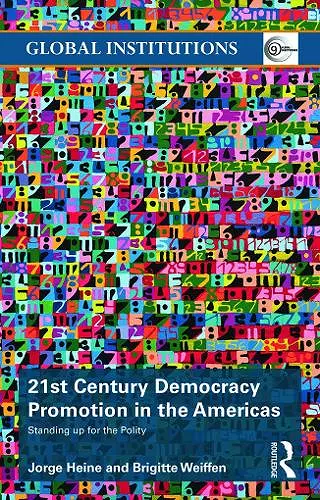21st Century Democracy Promotion in the Americas
Standing up for the Polity
Jorge Heine author Brigitte Weiffen author
Format:Paperback
Publisher:Taylor & Francis Ltd
Published:29th Sep '14
Currently unavailable, and unfortunately no date known when it will be back
This paperback is available in another edition too:
- Hardback£145.00(9780415626361)

This volume examines the promotion and defense of democracy in the Americas. Taking the Inter-American Democratic Charter (IADC) of 2001 as a baseline, it charts the evolution of the issue over the past decade.
Although it considers historical antecedents, the main focus of the book is on key instances of promotion and defense of democracy in the Western hemisphere since the adoption of the IADC. It analyzes democratic norms, norm enforcement mechanisms and how they work in practice. Special attention is paid to the 2009 Honduras coup, the issues raised by it and the debates that surrounded it, as this was the first instance in which a member state was suspended in accordance with the IADC. Three central themes guide the analysis: the nature of challenges to democracy in Latin America; the role of regional organizations as democracy promoters; and the transformation of Inter-American relations.
The book unveils the key achievements and limitations of the OAS in the field and will be of great interest to students and scholars of democratization, US-Latin American relations, international relations of Latin-America and international organizations.
This book very competently assesses the promotion and defense of democracy in the Americas focusing on the evolution of the issue since the Inter-American Democratic Charter of 2001. Other studies have dealt with the same issue, but this book is helpful in surveying all recent cases with particular attention to the 2009 case of Honduras. Another contribution is the analysis of the weaknesses and strengths of the Organization of American States (OAS) approach as well as that of other regional and global organizations. Chapter 1 sets the context for regional democracy promotion, chapter 2 traces the emergence of the OAS democratic paradigm, and chapter 3 deals with the Inter-American Democratic Charter of 2001. Chapter 4 assesses application of the OAS democratic paradigm in multiple cases in the 21st century, and chapter 5 focuses exclusively on the case of Honduras. Chapter 6 assesses the future of the OAS democratic paradigm, and chapter 7 provides a conclusion. The book is well written and organized, making it attractive for undergraduate students as well as graduate students and professionals.
--M. A. Morris, emeritus, Clemson University
The book delivers a good starting ground for com-paring the activities of regional organizations worldwide that seek to promotedemocracy, and it reminds the reader that democracy promotion is not onlyabout the support of atransition todemocracy, but also about the defenceand thesurvival ofdemocracy.
-- Aliaksandr Novikau, Northern Arizona University, USA
Heine's and Weiffen's book shows the difficulties regional institutions such as the OAS have experienced when trying to create mechanisms to promote and defend democracy. The book certainly is a contribution to the debate on the relations between regionalism and democracy in Latin America. Despite some criticism made in this review, the political, institutional, and legal analysis presented in the diverse chapters of the book aid in the understanding of what has been done and what should be done to strengthen democracy in Latin America.
-- José Briceño Ruiz,
This book very competently assesses the promotion and defense of democracy in the Americas focusing on the evolution of the issue since the Inter-American Democratic Charter of 2001. Other studies have dealt with the same issue, but this book is helpful in surveying all recent cases with particular attention to the 2009 case of Honduras. Another contribution is the analysis of the weaknesses and strengths of the Organization of American States (OAS) approach as well as that of other regional and global organizations. Chapter 1 sets the context for regional democracy promotion, chapter 2 traces the emergence of the OAS democratic paradigm, and chapter 3 deals with the Inter-American Democratic Charter of 2001. Chapter 4 assesses application of the OAS democratic paradigm in multiple cases in the 21st century, and chapter 5 focuses exclusively on the case of Honduras. Chapter 6 assesses the future of the OAS democratic paradigm, and chapter 7 provides a conclusion. The book is well written and organized, making it attractive for undergraduate students as well as graduate students and professionals.
--M. A. Morris, emeritus, Clemson University
The book delivers a good starting ground for com-paring the activities of regional organizations worldwide that seek to promotedemocracy, and it reminds the reader that democracy promotion is not onlyabout the support of atransition todemocracy, but also about the defenceand thesurvival ofdemocracy.
-- Aliaksandr Novikau, Northern Arizona University, USA
Heine's and Weiffen's book shows the difficulties regional institutions such as the OAS have experienced when trying to create mechanisms to promote and defend democracy. The book certainly is a contribution to the debate on the relations between regionalism and democracy in Latin America. Despite some criticism made in this review, the political, institutional, and legal analysis presented in the diverse chapters of the book aid in the understanding of what has been done and what should be done to strengthen democracy in Latin America.
-- José Briceño Ruiz, Universidad de Los Andes, Venezuela
ISBN: 9780415626378
Dimensions: unknown
Weight: 272g
196 pages